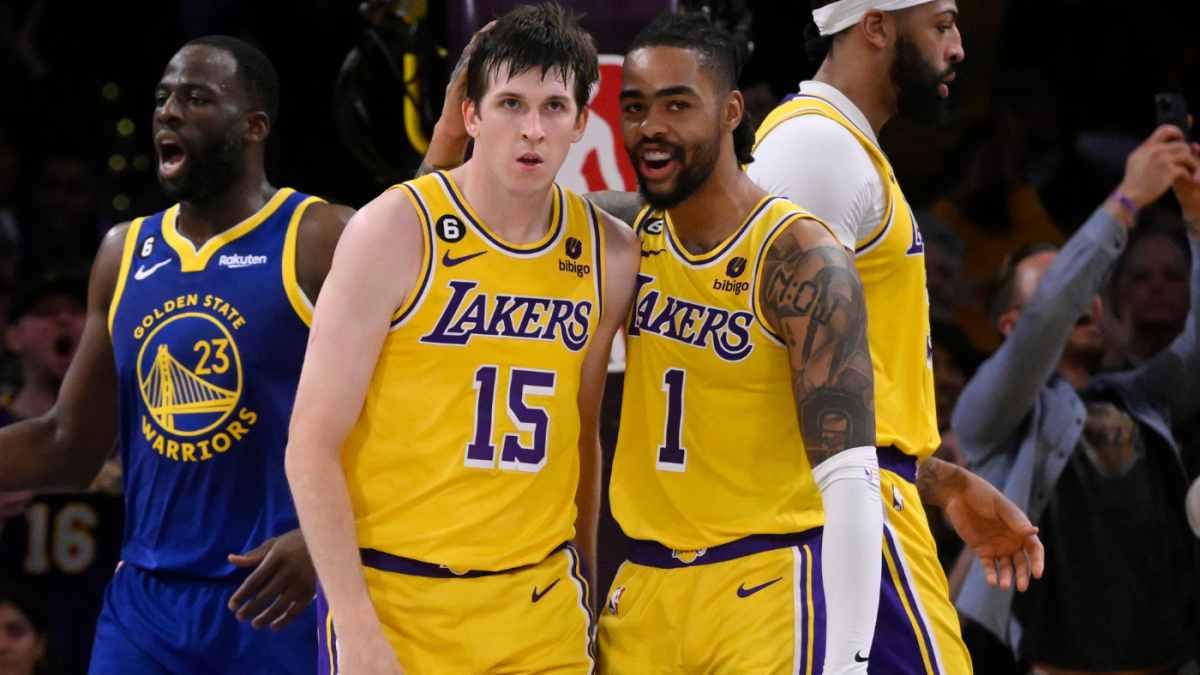Sports
Lakers improved in NBA free agency, but they're still far from favorites in the Western Conference – CBS Sports

Play Now
Football Pick’em
Play Now
College Pick’em
See who to add and drop
PGA Tour and beyond
Fans and teams alike have a bad habit of believing that any new season picks up right where the last one left off. If a team reached the conference finals in the previous season, why shouldn’t it expect to at least make it that far in the following season? Teams that make significant playoff runs often operate as though they are only a few slight tweaks away from making it even further rather than acknowledging that the field might only be a few small tweaks away from knocking them off far earlier.
The reality of most deep playoff runs is that they are, to some extent, circumstantial. The run that the Los Angeles Lakers went on last season is no exception. The Memphis Grizzlies likely would have been a more dangerous first-round opponent if two of their three best big men (Steven Adams and Brandon Clarke) were available to combat LeBron James and Anthony Davis. Andrew Wiggins never quite found his shooting stroke after missing the last 25 games of the regular season for personal reasons, and that made the Warriors slightly more vulnerable than they otherwise could have been.
The Lakers, meanwhile, benefitted from some shooting performances that likely weren’t sustainable. Rui Hachimura jumped from 34.7% on 3-pointers for his career to 48.7% in the playoffs. The greatest quarter of Lonnie Walker’s career saved the Lakers in the Warriors series. None of this is to suggest that the Lakers somehow didn’t deserve to reach the Western Conference finals, but rather, to acknowledge how finicky playoff results can be. The difference between the Lakers, Warriors, Grizzlies and a few other teams in the Western Conference was fairly minimal. Things broke right for the Lakers last season. They might not next season.
Of course, the right breaks can take you only so far. What became apparent during the playoffs as a whole is that the Denver Nuggets existed on an entirely separate tier from the rest of the NBA. As close as some of the four games the Lakers and Nuggets played were, Denver’s sweep should have made it relatively clear that the Lakers, like the rest of the NBA, simply were not good enough to beat the Nuggets last season. Any team hoping to credibly challenge the Nuggets would need to make some sort of significant addition in order to do so.
The Lakers had that opportunity. Had they renounced all of their own free agents aside from Austin Reaves, they could have created up to $29 million in cap space. Perhaps they could have used that space to entice former Rob Pelinka client James Harden into opting out of his contract and heading West, for instance, or they could have spread it among a group of external free agents.
They largely decided to run it back. Reaves, Hachimura and D’Angelo Russell were re-signed. The most notable changes the Lakers made were the additions of Gabe Vincent, Taurean Prince, Cam Reddish and Jaxson Hayes. Those players replace the departing Dennis Schroder, Lonnie Walker, Malik Beasley, Troy Brown Jr. and (likely) Wenyen Gabriel and/or Tristan Thompson.
Are the incoming players better than the outgoing players? Probably, yeah. Vincent and Schroder share similar flaws. They’re small for their positions and inconsistent jump shooters. Both play bigger than their size. Schroder is the better defender, but Vincent largely survived during Miami’s run to the Finals. He’s a better (and more willing) passer, though both take some questionable shots. Vincent is on the right side of the aging curve. Schroder isn’t set to decline yet, but he’s likely already in his prime. Prince and — to a lesser extent — Reddish offer badly needed size on the wings. Darvin Ham relied far too heavily on guards featuring three and sometimes four guards last season. That won’t be a problem now. Hayes offers a center-sized human being that can catch lobs and offer basic rim-deterrence on defense. If that sounds like faint praise, well, remember that the Lakers didn’t have either of those things when Anthony Davis sat last season.
But do these players improve the Lakers so much that they close the gap against Denver? Probably not, even acknowledging the sizable loss of Bruce Brown. Remember, Hachimura probably isn’t going to make half of his 3-pointers again next postseason. For that matter, Vincent is a career 34% shooter who jumped up to 38% in the playoffs, but more importantly, 45% in playoff fourth quarters. Can the Lakers rely on such timely shooting out of him two postseasons in a row? For that matter, one of the major arguments in favor of the Lakers eventually catching the Nuggets was the foot injury LeBron James played through during the postseason. It’s fair to wonder what might have been had he been at full strength. It’s unrealistic to assume to a 39-year-old James playing in his 21st NBA season will not only be fully healthy during a possible rematch, but still at the same, MVP-caliber level he remained at before his injury. James probably won’t have another injury-free season ever again. Eventually, he’s going to decline.
The Lakers trusted four players against Denver last season. Those four players are all back on the team. Did they add a fifth? It’s possible, but for now appears unlikely. Vincent struggled against Denver in the Finals. He played 38 minutes in Game 1 and 40 total minutes in Games 4 and 5. Small guards are targets to the Nuggets. Prince held up reasonably well against Denver in the first round, but he never played more than 23 minutes in any of Minnesota’s five first-round games against the Nuggets. He and Vincent would likely be able to help in that series. There’s little reason to believe either swings the outcome.
Right now, the Lakers are largely where they were a season ago, albeit with a bit more depth. They are within the non-Denver margin of error of the other Western Conference contenders. If they played the Suns or the Clippers or the Grizzlies or the Warriors in a series tomorrow, either team could credibly win based on health, shooting variance and a few random bounces here or there. That’s not exactly a bad place to be. It isn’t where the Lakers want to be.
That doesn’t mean running it back was necessarily a bad idea. After all, there was also the inherent risk of falling down off of that perch instead of jumping up onto the next one, and frankly, a lot of what worked for the Lakers last season probably will carry over into next season. However, if they played the Nuggets in a seven-game series tomorrow, there simply isn’t reason to believe the outcome would be any different than it was in May.
Fortunately, the Western Conference playoffs don’t kick off tomorrow, and for all of the words Pelinka has spent emphasizing continuity, it’s worth pointing out here that a year ago, the Lakers were talking about how Russell Westbrook would fit under Darvin Ham. Just because the Lakers ran it back today doesn’t mean they’ll have the same roster a year from now. The Lakers haven’t closed the gap against the Nuggets yet. That doesn’t mean they can’t later.
The Lakers have a couple of notable advantages over the field when it comes to mid-season movement. The new collective bargaining agreement prevents teams above the first apron from pursuing players on the buyout market whose previous salary was above the non-taxpayer mid-level exception (which is most of them). This effectively knocks the Nuggets, Suns, Clippers and Warriors out of the buyout market, making the Lakers the most desirable Western Conference team on the board.
The Suns are completely out of tradable first-round picks, and the Nuggets have only swaps to offer. The Lakers have some capital left to play with: an unprotected pick in 2029, and swaps in 2026, 2028 and 2030 are all on the table. Just as importantly: the Lakers have diversified their salary structure significantly. Part of what made trading so difficult last season was that most of their moveable salary was tied up in Westbrook. This season, the Lakers will have at least four eight-figure salaries aside from James and Davis: Vincent, Hachimura, Russell and Reaves. Prince, Jarred Vanderbilt and Jalen Hood-Schifino will all make above the minimum, and the Lakers can add one last hunk of tradable salary if they choose to re-sign Malik Beasley with Bird Rights, though that appears unlikely at the moment.
There’s one last offseason detail that hasn’t yet emerged that will reveal just how liquid the Lakers really are on the trade market, and it relates to Russell. He signed a two-year, $37 million deal to remain with the Lakers, but because the second year is a player-option, the old CBA would have given Russell the right to veto any trade. The new CBA has amended this rule, but only slightly: now, players in this situation can mutually agree with their team upon signing to waive that right. We don’t yet know if Russell will do that.
That Lakers should hope that he does, as he is by far the most sensible trade candidate on the roster. The Vincent signing was, ostensibly, Russell insurance. Russell has a shaky postseason history, and Vincent just started for a Finals team. The Athletic’s Jovan Buha reported that the Lakers plan to run more of their offense through Reaves this season, and with James also commanding a ton of possession, Russell’s position on this team is pretty clear: serve as a regular-season innings eater, and then make yourself scarce when the games start to count.
The likeliest path to a significant midseason improvement would be to package Russell’s projected $17.8 million salary with some of that remaining draft capital and perhaps another smaller salary or two in order to get that last piece, that fifth reliable player to throw at Denver in a possible rematch. Who might that player be? By waiting until the season to take their big swing, the Lakers are giving the current roster half of a season to show them where their needs truly lie. If they need another scorer? Perhaps they take another run at DeMar DeRozan, who is currently on an expiring contract playing for a non-contender. Does Davis need to play major minutes alongside a true center? Circle back on Myles Turner. See what the market has to offer. Use the first few months of the season for self-evaluation.
The Lakers successfully did that a season ago, and that’s probably what informed their decision to run this roster back. They know they took a major step, and they also know they’re capable of taking another one down the line. That is the step that it is going to take to beat the Nuggets, because right now, the Lakers are in danger of falling back into the pack.
© 2004-2023 CBS Interactive. All Rights Reserved.
CBS Sports is a registered trademark of CBS Broadcasting Inc. Commissioner.com is a registered trademark of CBS Interactive Inc.
Images by Getty Images and US Presswire









